#justin fashanu
Text
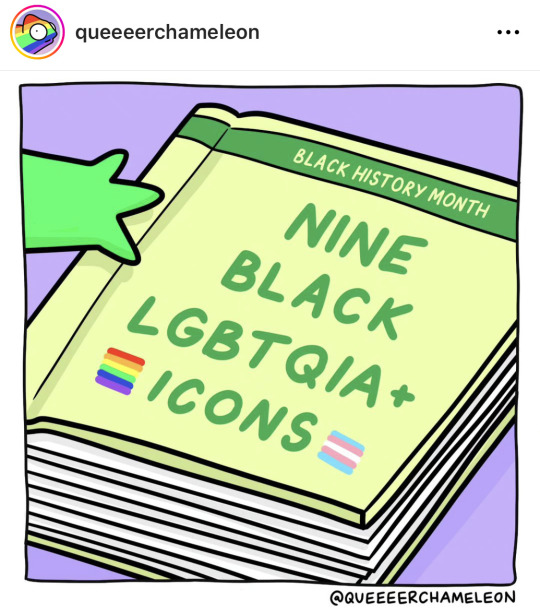
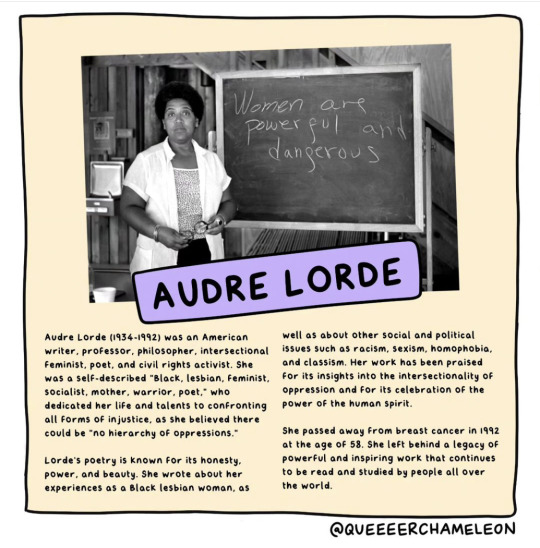
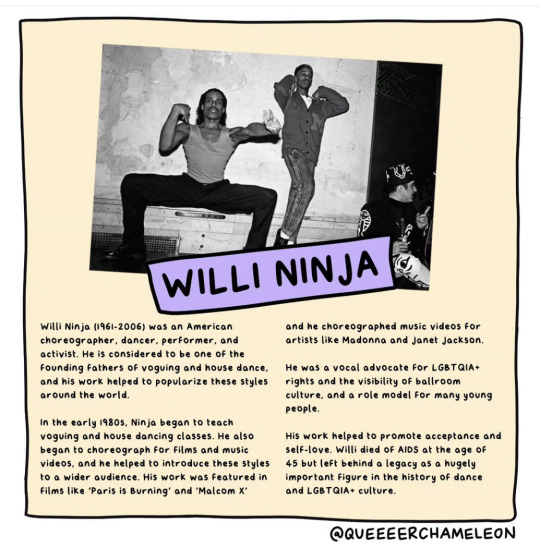
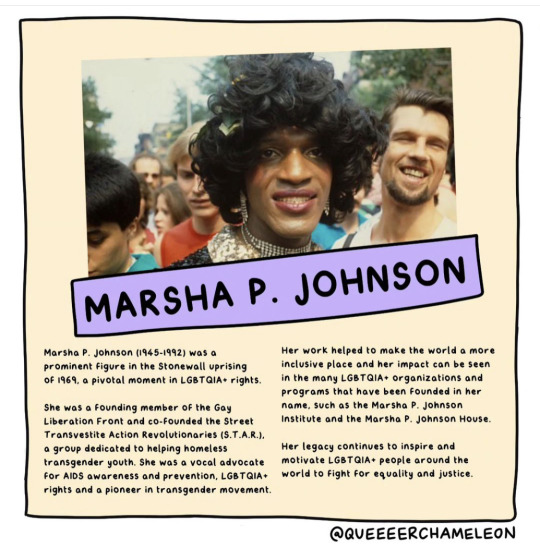
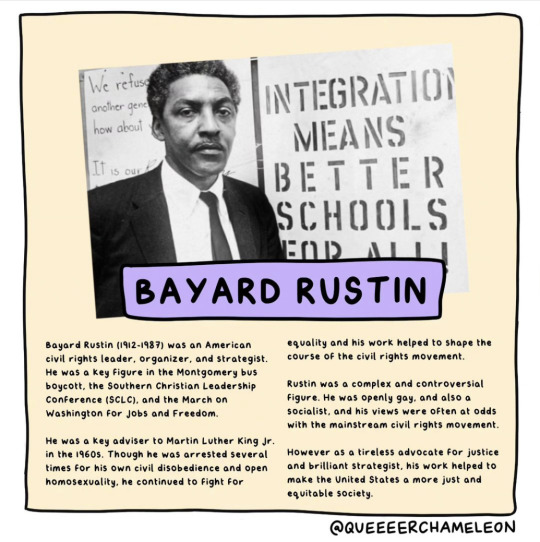

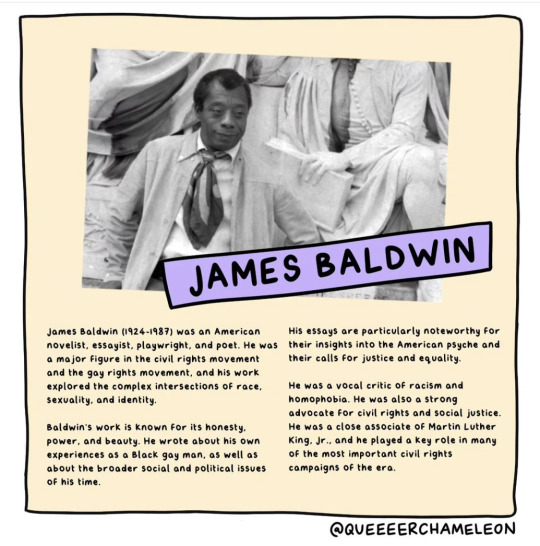
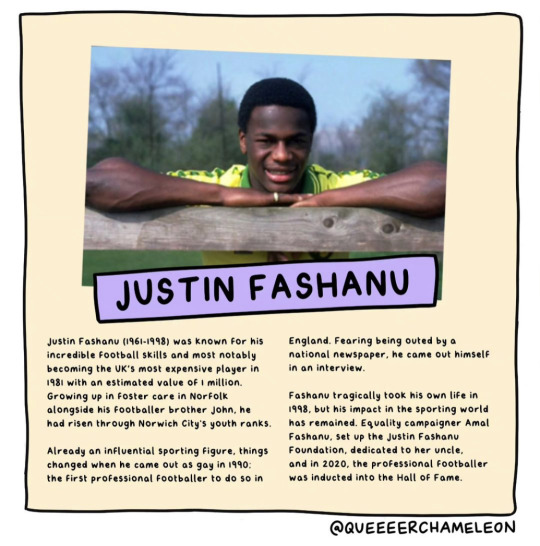
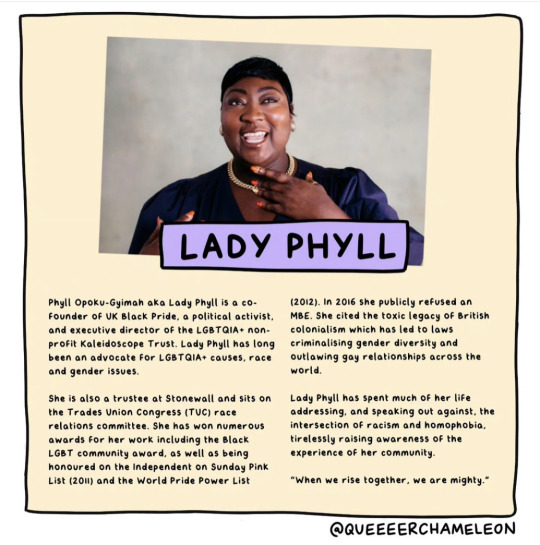

#black history month#queeeer chameleon#audre lorde#willi ninja#marsha p johnson#bayard rustin#stormé delarverie#james baldwin#justin fashanu#lady phyll#yasmin benoit#queer history
5K notes
·
View notes
Text
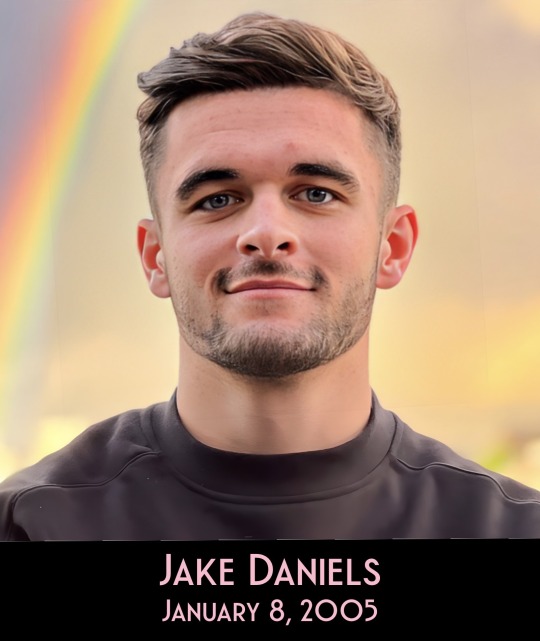
Congratulations to Jake Daniels who public ally came out as gay in May 2022. Daniels become the UK's only male professional footballer to be publicly out at the time. and the first since Justin Fashanu in 1990. He thanked Olympic diver Tom Daley for helping to make the decision. He also thanked Australian footballer Josh Cavallo who came out as gay earlier in the year.
Daniels had played football (aka soccer) with Blackpool FC’s under 18s since the age of 7. He officially joined Blackpool's youth team for 2020–21, scoring 30 goals for the U18s. He signed his first professional contract with the club in February 2022.
#gay icons#Jake Daniels#English football#soccer player#black pool fc#Tom Daley#Justin Fashanu#Josh Cavallo#congratulations
78 notes
·
View notes
Text
How homophobia claimed the life and career of Justin Fashanu, the world’s first openly gay footballer
30 years after Justin Fashanu came out publicly to the world, former friend Peter Tatchell reflects on the late sportsman's complicated legacy.
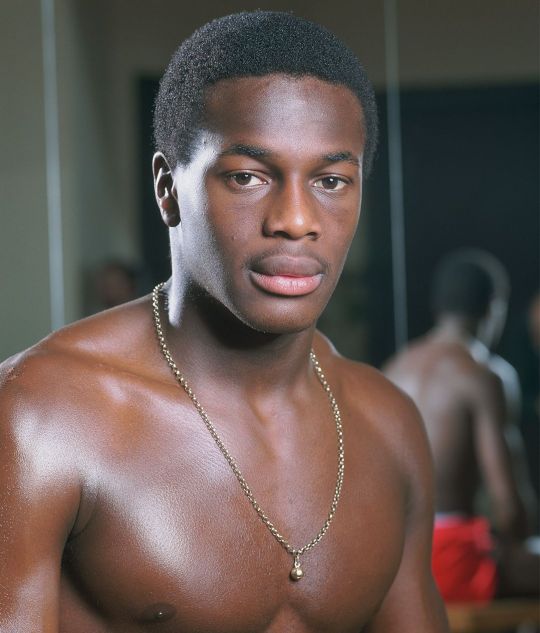
Thirty years ago, on 22 October 1990, Justin Fashanu became the world’s first professional footballer to come out as gay. To this day, he’s the UK’s only top-tier male football star to declare his homosexuality while playing in this country. At the time, he said he knew 12 other Premier League footballers who were gay or bisexual. None followed his example of openness, then or since.
Justin was also the first black player to be bought by a club for £1 million and the first prominent black person in Britain to come out as LGBT+. Other black personalities, including the singer Labi Siffre, artist and film-maker Isaac Julien and Lambeth Council leader Linda Bellos, had already come out, but they didn’t have Justin’s high profile and national recognition.

Justin came out in The Sun newspaper, under the headline “£1m soccer star: I am GAY”. He said he wanted to stop “living a lie”. His otherwise dignified and courageous article was marred by titillating tales of sex with a married MP, romps in the House of Commons, and affairs with pop singers, TV stars and other footballers.
It was also tainted by the fact that he sold his story for a huge pile of money, reputedly £70,000 or more. He subsequently admitted that elements of his story were embellished because, in his words, he was “under pressure” from the paper to give them sensational gossip.
A week later, his brother, fellow footballer John Fashanu, disowned Justin in the black newspaper, The Voice. “John Fashanu: My gay brother is an outcast” screamed the headline. John later admitted to offering Justin £75,000 to stay quiet and keep his sexuality secret.
He told the Daily Mirror: “I begged him, I threatened him, I did everything I could possibly do to try and stop him coming out… I gave him the money because I didn’t want the embarrassment for me or my family.”
John later expressed regret about his behaviour. However, he continued to disrespect his brother’s memory when he claimed in a 2012 interview with talkSPORT radio that his brother was not gay but merely a fame-obsessed attention-seeker.
Justin told me he was heartbroken by the “terrible” things John said about him. He never got over what he saw as betrayal by a brother he loved.
The reaction of the wider black community was just as bad. His coming out was condemned by The Voice as “an affront to the black community… damaging… pathetic and unforgivable”.
“We heteros”, wrote Voice columnist Tony Sewell, “are sick and tired of tortured queens playing hide-and-seek around their closets. Homosexuals are the greatest queer-bashers around. No other group of people are so preoccupied with making their own sexuality look dirty.” Sewell only very recently apologised for those comments.
“Even if Fashanu had chosen to come out in The Voice rather than The Sun, I doubt his reception would have been any more sympathetic,” noted media columnist Terry Sanderson, soon afterwards. “Rejection by his own community was profoundly damaging to him.”
Although Justin later said that he “never once regretted” coming out, the hostile reaction from many in the black community hurt him deeply. He told me that since black people knew the pain of racial prejudice and discrimination, he expected they’d be understanding and supportive. Some were, but many denounced him for bringing “shame” on them.
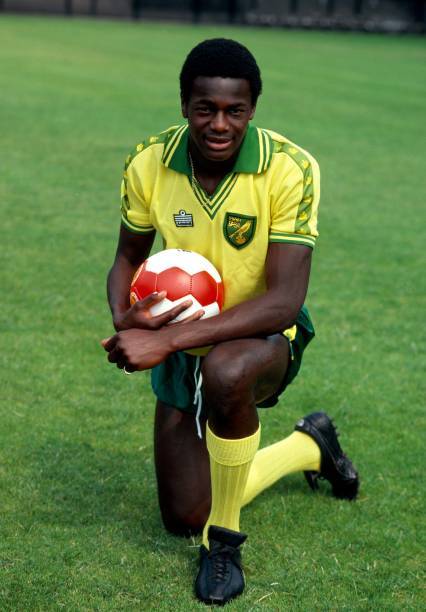
As far as I recall, not a single black public figure supported his coming out or condemned The Voice and others in the community who had trashed him. Justin later told The Voice: “Those who say that you can’t be black, gay and proud of it are ignorant.”
Nevertheless, there were moments during his coming-out saga when he confessed that he felt “incredibly, almost suicidally, lonely”.
Justin faced a lot of criticism for choosing to come out in the right-wing, homophobic Sun newspaper, which many black people also regarded as racist. Justin responded by saying that his fans read the tabloids, not the Sunday Times. By coming out in The Sun, he hoped its reporters would cease hounding him: “I genuinely thought that if I came out in the worst newspapers and remained strong and positive about being gay, there would be nothing more that they could say.”
Some people say the press knew Justin was gay and were planning to out him. He supposedly struck a deal with The Sun to pre-empt this: “So my sexuality could be revealed on my terms,” he told me.
However, in the book, Stonewall 25, Justin claimed that he came out because he was distressed by the tragedy of a 17-year-old gay friend who had been forced out of his family home by homophobic parents, and who subsequently committed suicide: “I felt angry at the waste of his life and guilty because I had not been able to help him. I wanted to do something positive to stop such deaths happening again, so I decided to set an example and come out in the papers.”
Whatever the true reason for him coming out, one thing is certain: he wasn’t fully prepared for the backlash and the “heavy damage” it would inflict on his football career. He got homophobic abuse from fans, and few clubs were willing to sign him given his diminishing goal-scoring abilities.
This was a far cry from his glittering football debut. In 1980, aged 19, Justin was signed to Nottingham Forest football club for £1 million. The expectations were huge. There was the pressure to deliver goals and to become a black spokesperson. He found his sudden celebrity status both a blessing and a great burden.
Justin was closeted back then and found it immensely difficult to be gay in the macho, straight world of football — not to mention the stress of living a secret gay life while under the glare of the media spotlight.
Like many black footballers in those days, he was subjected to racist taunts by fans from rival teams. They would make monkey noises and gestures, and throw bananas onto the pitch. But it was anti-gay prejudice that ultimately dragged him down.
“A bloody poof!” That’s how his manager at Nottingham Forest, Brian Clough, described his star player. Although Justin laughed them off, Clough’s sneers hurt inside, making it hard for him to concentrate on playing ‘the beautiful game’.
Justin and I met at the London gay nightclub Heaven in 1981, soon after he realised he was gay. I had been selected as the Labour parliamentary candidate for Bermondsey. We became close friends.
Justin confided to me about the problems he was having at Nottingham Forest. “Clough doesn’t respect or support me,” he complained more than once.
In his autobiography, Clough recounts a dressing-down he gave Justin after hearing rumours that he was going to gay bars: “’Where do you go if you want a loaf of bread?’ I asked him. ‘A baker’s, I suppose.’ ‘Where do you go if you want a leg of lamb?’ ‘A butcher’s.’ ‘So why do you keep going to that bloody poofs’ club?’”

Sadly, the clash with Clough turned from bad to worse. Justin’s performance went into a tail-spin. Desperate for emotional reassurance, he turned to evangelical Christianity, which further screwed up his life. With his church damning homosexuality, he became conflicted and stressed. Desperate attempts at relationships with women failed. While publicly proclaiming Christian celibacy, he ended up resorting to furtive gay sex. This made it impossible for him to have a stable same-sex relationship.
Caught between God and gayness, he suffered intense emotional and psychological turmoil.
Justin became erratic and unpredictable, both on and off the pitch. His sometimes bizarre, indefensible behaviour can only be fully understood in the context of a potentially brilliant football career cut short, largely by homophobia. He became trapped in a downward spiral of declining football prowess, bad debts, unreliability, false claims about sexual affairs with politicians and soap stars and desertion of long-standing friends, including me.
By the late 1990s, Justin had embarked on a new career coaching the US football team, Maryland Mania. Hopes of a fresh start were shattered in April 1998 when he was accused of sexual assault of a 17-year-old youth. Claiming he would not get a fair trial, he fled back to Britain. On 3 May, he was found hanged in a deserted lock-up garage in London.
His suicide note denied the charges, claiming that the sex was consensual and that he was being blackmailed by his accuser. Part of the note read: “I realised that I had already been presumed guilty. I do not want to give any more embarrassment to my friends and family.”
Whatever the truth about these allegations, Justin had — like all of us — his share of failings. Without excusing these mistakes, they were the culmination of a lifetime of rejection that began when, as a young boy, he was given up by his mother and put in a Barnardo’s children’s home.
Despite all the rejection he endured, Justin had a remarkable, praiseworthy capacity for forgiveness. Talking of the hurt inflicted on him by others, and acknowledging his own errors of judgement, Fashanu wrote in 1994: “I don’t think you ever forget those mistakes, or the mistakes that other people make that wound you, but it is important to forgive.”
Justin Fashanu was a trailblazing star – he was not flawless, but a star nonetheless.

(Peter Tatchell is director of the Peter Tatchell Foundation)
#Pride Month 2022#Justinus Soni Fashanu#Justin Fashanu#England National Team#Norwich City#Adelaide City#Nottingham Forest#Southampton#Notts County#Brighton & Hove Albion#Los Angeles Heat#Edmonton Brickmen#Manchester City#West Ham United#Leyton Orient#Southall#Hamilton Steelers#Toronto Blizzard#Leatherhead#Torquay United#Airdrieonians#Trelleborg#Heart of Midlothian#football#fussball#fußball#foot#fodbod#futbol#futebol
28 notes
·
View notes
Text
Not my stupid little writer brain trying to tell me Colin is going to get outted next episode.
All I'm saying is Rule of 3; Colin's been accidentally found out twice now and thankfully it's ended up fairly well after both, rule of 3 though states they're going to fuck with that. So if they do rule of 3 it (which I'm not saying they will but they literally spent the last 3 season's doing it with Rebecca's yearly truth bomb, so...) there's no other way it can go. Or at least no other way I can think of it going.
Now I fully could be wrong, like I do have a habit of over analysing plot beats (proven time and time again by the discussions I have about the plays I usher for) but the writers are extremely smart so I don't think it's too outrageous to think they'll go down this route.
And yeah, Colin's arc has been really good so far, and in a nice place to leave it but at the same time it feels like there's still more to come, like they haven't quite rounded it off yet. So there's a chance we're building to this.
Anyway yeah, could be spouting absolute bullshit here but writer brain hath gifted me thoughts
#ted lasso#ted lasso spoilers#Colin Hughes#Got a week to wait and then we'll see if I'm right I guess#Also if this does happen and they don't mention Justin Fashanu or Jake Daniels I will riot#Like Justin Fashanu is extremely important queer football history#Even if his story is heartbreaking he was the first openly gay professional footballer#for a storyline abut a queer professional football player is feels like there should at least be some acknowledgment of Fashanu#and with Daniels he came out at 17#he's 18 now and he's the only out gay footballer in the top four male divisions in the UK#I'm writing a play about homophobia in football at the moment so this is all really at he front of my mind at the moment
0 notes
Text

ona via ig stories 🏳️🌈
the international day against lgtbi-phobia in sport is held in memory of justin fashanu who would’ve turned 63 today 🖤🤍 thank you barça
28 notes
·
View notes
Text
at only 17 years old, jake daniels has come out as gay making him the first uk male professional footballer since justin fashanu in 1990 to do so
not only is this a gateway to other lgbtq+ male footballers to continue playing the sport they love despite their sexuality, it is a monumental thing in uk football history
football hooliganism is rooted in the core of uk football and with jake daniels coming out he is essentially saying a big massive fuck you to all of that
so a massive congratulations to jake daniels for doing this and he is 100% going to be a role model to other lgbtq+ male footballers
732 notes
·
View notes
Text
while i'm here... on jamie's bisexuality.
there are no out queer premier league players. none. the first ever english player to come out was justin fashanu in the 90s, and his story is a tragic one that i'm not going to go into details here about but know that jamie knows it and it deeply impacts him. the only out queer footballer in english football right now plays for blackpool in league one (and he's really only on the development team).
the homophobia in english football is rampant. there's homophobic chanting in the stands frequently, despite it being banned by the fa since 2007. there's a yearly campaign run by the prem called rainbow laces, and just look at the replies to the posts about it on twitter if you want to see the attitudes of people who watch english footy in regards to queerness. some clubs have systems where you can report homophobic chanting, and city is notably the first premiership club to be recognized as a queer-friendly employer, but that number of out top tier footballers is still zero.
jamie has always been (canonically) a coward. he'll do what's right.... only if a few people do it first (see: sam's dubaiair campaign in s2). he'll speak up about things with his teammates (see: city are great, but so are we). and he doesn't mind being put on a pedestal and asked questions (there's a clip on twitter of him doing this after sam's campaign). but he's not brave enough to be the first. he just isn't.
he knows he's bisexual, but he'll never put that label on himself without a lotttt of therapy. while georgie would obviously never have a problem with it, would be proud of him no matter what, as long as he's happy she's happy, he also had a lot of james' influence growing up. james who would call him slurs for having his hair too long, or watching roy's games/pressers/etc too much, or just about anything that he perceived as emasculating. that influence won't just disappear.
jamie would never ever demean someone for their queerness (we see him outright supporting colin in the best way he can), but he can't label it in himself. he loves being with men, hooking up with them, kissing them, touching them. he'll easily kiss his teammates' faces/necks when they score goals. he did that interview where he said beard wasn't his type on national tv after the fa cup semifinal in s2. it's not like he hides who he is. but he'll never be able to get up on those big platforms and Come Out without someone else going first. he finds it difficult to try to tackle romantic relationships with men because he has to hide who he is in public.
the number is zero. and jamie's too afraid to be the one.
#headcanons !#writing this up so i can link it from my carrd#i am writing this as someone who's queer & trans and loves the english game#but fuck there's a long long way to go
8 notes
·
View notes
Text
Robbie Rogers had finally reached his boyhood dream of playing professional soccer, first as a part of Columbus Crew in Ohio and then later as a member of the English soccer team Leeds United. But he was keeping his personal life—and the fact that he was gay—a secret. “My experience in sports was that you can’t be gay. The only person I knew about was Justin Fashanu, and he killed himself,” Rogers says now, reflecting back on that time. “I was very much struggling with who I was. I hadn’t had a love story of my own. I was thinking about regrets and where I would be in 10, 20, 30 years.”
While in Leeds, someone gave him a copy of My Policeman, a 2012 romance novel by Bethan Roberts. It shook his world. “It was kind of like my coming-out book,” he says. “I really think the book found me.”
The story, set in Brighton in 1957, follows a policeman named Tom Burgess who is gay, but living in a society where it’s illegal to be so. He begins dating a schoolteacher named Marion, but also embarks on a love affair in secret with a museum curator named Patrick Hazelwood. Forced to repress his true feelings, he decides to marry Marion, and as tensions rise between the married couple, Patrick’s life ends up in shambles.
It’s a powerful story of forbidden love, regret, and living as your true self. Rogers, who came out publicly in February 2013, has read it multiple times over the years and eventually shared it with his then boyfriend, prolific producer Greg Berlanti (they married in 2017). They teamed up with Sarah Schechter, partner at Berlanti Productions, to produce the project and adapt the novel into a film.
The end result is a sweeping love story, starring three bright-burning stars—Harry Styles, Emma Corrin, and David Dawson, as shown in these first-look images—that captures the stifling hold of societal hurdles. It took about eight years to get it made, but for Rogers, it feels like the film, which Amazon will release in theaters in the U.S. and U.K on October 21 and on streaming worldwide November 4, is coming out at just the right time. “Unfortunately, we see what’s going on in Supreme Court, what’s going on in Texas, going in Florida, in different places in the world,” says Rogers of the recent string of antigay “Don’t Say Gay” bills and similar legislation. “The world moves forward slowly and then there are very ignorant people that want to send us back to the ’50s.”
My Policeman jumps between two time periods: the 1950s, in which Tom (Styles) is navigating this love triangle with Marion (Corrin) and Patrick (Dawson); and 40 years later, when Tom (Linus Roache) and Marion’s (Gina McKee) strained life together becomes more complicated when Marion agrees to take in Patrick (Rupert Everett) after he suffers a stroke.
When director Michael Grandage, a prolific British theater director who found himself drawn to the story as a gay man, began looking for the trio of young actors to star in the 1950s-set story line, Styles was not on their radar. His team actually came to Grandage’s, saying that Styles had read the script and was very interested in the film.
Grandage met with Styles in his London office, and was immediately impressed by the pop star. Styles, known best for his time as a part of boy band One Direction and his successful solo career, hadn’t done much in the film world yet, making his acting debut in Christopher Nolan’s 2017 war film, Dunkirk. But Grandage says Styles came to that meeting as a fully formed actor. “He had read the script so many times that he knew every single beat of it at that meeting. I found that incredibly impressive. He knew other people’s lines; he knew all of his lines. He knew why he wanted to talk about it, why one scene worked this way and another worked,” says Grandage.
Styles’s career onstage and the massive fan following he’s amassed also made it clear that he and Tom actually have a lot in common. “This story is about two people that are in love with Tom, slightly obsessed with him,” points out Rogers. “Harry—the world is so transfixed on him, on his every move.”
And it would turn out, Styles’s limited experience as an actor worked well for this part, says Grandage. “Because he hasn’t done much, he hasn’t developed the ability to work out tricks or even lie. He can only do it truthfully and as he knows it,” he says, likening his naturalistic work to that of a young Albert Finney or Tom Courtenay. “They just bring themselves to the role, and it seems to be very uncomplicated in the way they achieve it and Harry had that,” he says.
While there’s been a diversifying in the sorts of love stories that make their way onto screen (including the recent release of gay rom-com Fire Island), conversations about who should be cast in the lead roles in a film like this are still ongoing and nuanced. Rogers and Grandage said there were several discussions about casting their three stars, and the importance that the LGBTQ+ community was represented. “We thought it would be wonderful to do a film like this and at least have some people in it who could speak to an experience that was authentic for themselves,” says Grandage. Since Patrick is the character who is most open about his sexuality, Grandage says it was important to find a pair of actors that would “be able to bring something of themselves to it and also be able to speak to it as well.” They found that with Dawson, whom Grandage had worked with several times in the theater, and Everett.
Corrin was cast before their breakout season of The Crown had been released. Marion is a relatively progressive character; in Corrin, who came out as nonbinary last July, the creative team found someone “you can’t take your eyes off of,” says Rogers.
As for Styles, who has grabbed headlines for his gender-bending fashion but doesn’t speak much on his sexuality, their focus was on casting someone who could come to grips with the character’s inner turmoil. “The whole point of Tom is that he is a character who is confused. It’s made more problematic by the fact that he’s a policeman, and he’s in a career that is about upholding the law. And the law in the country at the time is about everything he feels—the complexity of it is something that whoever was going to play younger Tom and older Tom needed to somehow understand and absorb,” says Grandage.
Grandage and the cast had about three weeks of rehearsal, a process he says went especially smoothly. “It was very, very easy, because all three of those younger actors are very open—they don’t make acting difficult and they don’t make the process of filmmaking difficult,” he says. “They come open-minded, wanting to please each other. They were there for each other.”
That rehearsal also gave the cast a chance to work through the film’s the sex scenes. Grandage says that they were carefully choreographed to avoid prurience: to “quite literally show something that was about ‘lovemaking’ in the broadest sense of the word, something that was choreographically interesting and not just some kind of thrusting sense of sex going on.”
Grandage was inspired by the 1959 Alain Resnais film Hiroshima mon amour, in which the body language is “very sculptural,” and brought on an intimacy coordinator to help the actors feel comfortable during the most sensual scenes, which were between Tom and Patrick. The most heartbreaking part of My Policeman, says Grandage, “is that these two men, when they’re together, seem to be free. And then when he has to have an act of lovemaking, or a sexual act, with his wife he seems to not have that freedom, just even in his body language.”
Despite having a star-studded cast and what felt like a unique story, Rogers says My Policeman wasn’t an easy film to get made. “I won’t be specific [with names]…but I think for the last eight years, we’ve always heard the most political versions of ‘this is going to be difficult to make’ or ‘no one’s going to watch this,’” he says. So to see it finally make its way to screens will feel especially sweet for all those involved.
And while My Policeman feels especially timely, it is, at heart, a story about romance and letting yourself find love. It’s a story that helped many, like Rogers, find their way to their true selves, and he hopes perhaps this film can do the same for others. “It’s never too late to have a love story,” says Rogers. “Don’t allow regret to weigh you down—there’s always hope.”
273 notes
·
View notes
Text
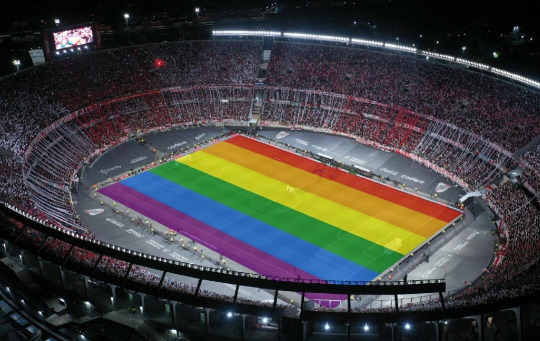
El 19 de febrero es el Día Internacional Contra la Homofobia en el Fútbol, en homenaje al nacimiento de Justin Fashanu el primer futbolista de élite en reconocer públicamente su homosexualidad.
Fue en 1990 y después de aquel hecho, Fashanu fue expulsado del equipo y objeto de burla por algunos de sus compañeros. Años después y tras una acusación falsa de violación, el jugador entró en una profunda depresión y se suicidó en 1998.
Para que hechos como estos no se vuelvan a repetir, se celebra esta efeméride, para el fin de la discriminación por razones homófobas en el fútbol, y en el deporte en general.
3 notes
·
View notes
Photo
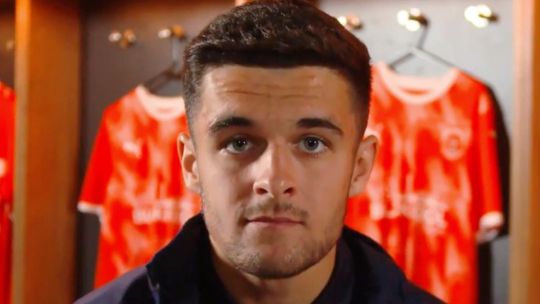
Jake Daniels
Gender: Male
Sexuality: Gay
DOB: 8 January 2005
Ethnicity: White - English
Occupation: Prof soccer player
Note: In May 2022, Daniels came out as gay, becoming the UK's only male professional footballer to be publicly out at the time, and the first since Justin Fashanu in 1990
84 notes
·
View notes
Text
LGBTQ+ Representation in Ted Lasso (S3 Spoilers ahead)
After speculating for years, fans of Ted Lasso were finally given confirmation that three supporting characters identify as LGBTQ+. And although my dream of Ted and Trent never came to be, the show did portray groundbreaking representation in the characters Trent, Colin, and Keeley, (portrayed by James Lance, Billy Harris, and Juno Temple, respectively).
It may not seem impressive, but according to the website SportingNews, “Blackpool FC star Jake Daniels has taken the inspirational step of becoming the first male English professional footballer to publicly come out as gay in over two decades.” Daniels is currently the only out player in UK’s Premier League, but he is likely not the only one. PinkNews cites prevalent homophobia and advice to stay in the closet as common reasons players refrain from coming out. One manager even went as far as to tell a player, “‘I think it’s best for you not to come out until we get you a transfer or into a different club.’”
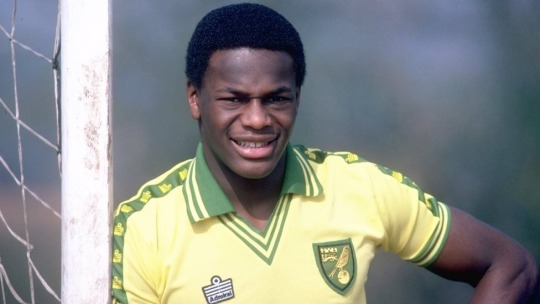
The image shown is Justin Fashanu, the first openly gay English football player. He came out in 1990, only to take his own life in 1998. Fashanu was posthumously inducted into the National Football Museum’s Hall of Fame in 2020.
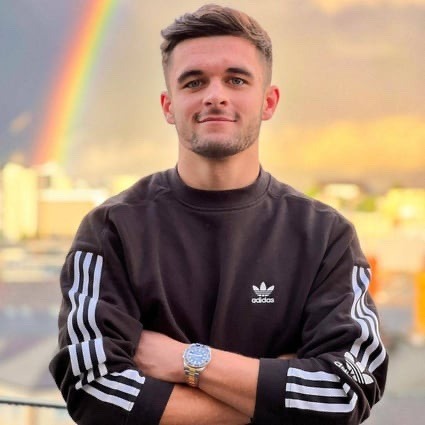
Pictured here is Jake Daniels, the only currently out member of the UK’s Premier League.
Although the show doesn’t dive too deeply into the ingrained homophobia in the sport, Ted Lasso’s Colin Hughs portrays the difficult and impactful decision of coming out in professional football. No matter how fans feel about the Emmy award-winning show's third and final season, we can all agree that the LGBTQ+ representation is nothing short of revolutionary.
For a television show bold enough to tackle generational trauma, mental health, and sexuality; the topic of positive LGBT+ representation seemed to be forgotten. Despite my appreciation for the portrayals, I feel more could have been explored within Colin’s storyline. As crucial as Colin’s coming out is, I can’t help but groan at the idea of yet another coming out story. Audiences nowadays don’t need stories exclusively containing coming-out plots. We need stories of queer characters living and thriving in the world – an unfortunately tall order for studios today.
I cannot express how ecstatic I was when Keeley and her girlfriend, Jack, kissed. It is so refreshing to see Trent Crimm and Keeley Jones be unapologetically themselves in season three; Keeley meets her girlfriend and Trent Crimm confides in Colin about his own struggles coming to terms with his sexuality. However, I couldn’t help but wonder, how would the fictional LGBTQ+ Richmond fans feel about seeing an out Colin on the pitch? Would they feel the same pride as I do when I see Keeley kiss her girlfriend in public?
Colin is in a precarious situation as he considers coming out publicly. He’s not just a member of a team – he’s a public figure with people looking up to him. If he comes out to the world, he’ll be in the history books as the first openly gay football player in the premier league. And although that’s a big responsibility, someone has to be the first. I wish we could have seen that be Colin.
The series ends with Colin celebrating the Richmond win by kissing his secret boyfriend on the pitch in front of countless fans and cameras. It is heartwarming to watch. The only thing that would make it better is if the show could portray the importance of representation by showing the fans’ reactions. Did Colin have any fans talk to him after the game? Were they comforted by the fact that they are no longer alone in both loving football and fearing losing it to their sexuality?
Ted Lasso is a show about forgiving yourself for past mistakes and becoming the best version of yourself. But, it’s also about representation and how it only takes one person to change the entire culture of a place. Ted’s positive nature, patience, and willingness to be called a wanker by nearly everyone in the stadium, are what allow him to succeed in making Richmond a tight-knit club off the pitch and a killer adversary on it. Thanks to Doctor Sharon, Colin finally feels confident enough to become the strong LGBTQ+ role model he was always capable of being.
Perhaps we’ll see Colin step up as a role model in the hinted-at spin-off series. But, for now, we can sit back, relax, and enjoy the wonderful LGBTQ+ representation in Apple TV+’s Ted Lasso.
For more articles like this visit Sapphire Society
#ted lasso s3#ted lasso spoilers#ted lasso#ted lasso tv#lgbtqa#colin hughes#keeley jones#lgbt representation#opinion#jack danvers#apple tv#tv+
9 notes
·
View notes
Text
It has come to my attention that some people in the Ted Lasso fandom are not aware of the importance of rainbow captain’s armbands in football, and I have too many emotions about those to not make a post. Keep in mind that I’m mostly familiar with the German Bundesliga and don’t know much about the Premier League, so if any people want to share more on that, feel free to add on to this post!
Where it started
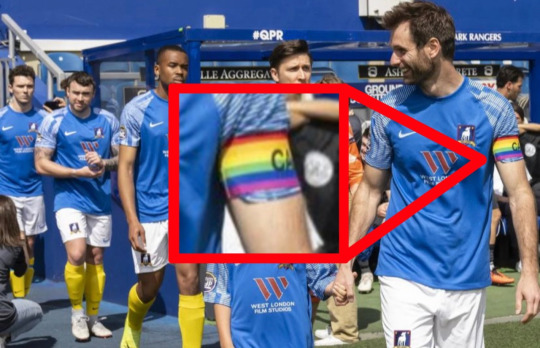
around two months ago, some of the cast and crew of Ted Lasso played a charity match (see here); actor Joe Street, who plays Paul Reynolds on the show, wore a rainbow captain’s armband. this, among other things, has led to some speculation that there will be a queer storyline in s3 (see here and here).
Why it matters
If you’ve followed the women’s Euro 2022 tournament recently (see here) or seen some pictures at least, and if you take the general culture of representation in media as an indicator, you might be led to believe that the rainbow armband doesn’t mean much - that it’s just a nice, but ultimately meaningless gesture of virtue signalling. And I wouldn’t even completely disagree with that. Most of the time, when players or teams give statements on the meaning of that rainbow armband, they describe it as a symbol against homo-/queerphobia in their sport - but most of them are pretty quick to add that it also symbolizes the fight against racism, sexism, discrimination based on religion, nationality, etc. The message gets watered down into a nice little message of ‘diversity’ and ‘equality’, often paired with the slogan “football is for everyone.” The rainbow in its original meaning for queer struggles and queer life is made into a non-threatening thing that’s supposed to be palpable for most people.
BUT --
But I’m begging everyone to look deeper, because there’s a reason for that. And the reason is - you could have guessed it - queerphobia in football. (I will now especially talk about men’s football because that’s what the show is about and it’s also my area of expertise. if you add women’s football into the conversation, you gain important insights, but this post is already going to be long enough, so maybe someone else will have to do that, either on this or another post.)
The reason the rainbow gets so watered down as a symbol in football is BECAUSE there’s still an unlimited amount of fear to be perceived or outed as gay/queer if you’re a professional male football player. Do you know how many active professional male footballers there are currently in the top leagues, worldwide? Two. Josh Cavallo came out in October 2021 in Australia (see here). Jake Daniels came out in May 2022 (see here) - he plays for Blackpool F.C. in the Championship League. Before Daniels, the only football player who came out during his career in the UK (and as far as I’m aware, in any major league anywhere) was Justin Fashanu in 1990. I will not link to articles or go into details, but please be aware if you google this, most articles will discuss racism, homophobia, sexual assault allegations and suicide. With a precedent like that, it took more than 30 years before any other active player dared to take that step. No matter how open-minded you think society has become over the last decades, you have to keep in mind that, despite all its claims towards the opposite, football is still one of the last safe spaces for both subtle and rampant homophobes.
Back to the rainbow armband
As far as I can tell, it was merely six years ago when the first rainbow armband appeared on a football pitch (see here) - in 2016, in the aftermath of the Pulse shooting, US-American team captain Michael Bradley wore one in a match against Ecuador. In Germany, it was especially the 2017/2018 and the 2018/19 seasons that popularized this as a regular practice for certain teams in the Bundesliga, starting with St. Pauli in 2017 (I couldn’t find an english source for this) and VfL Wolfsburg in 2018 (and initiated by their women’s team captain the previous season, see here). From there, it spread over to various other clubs like SC Freiburg, who announced in early 2021 that all team captains would wear the rainbow armband for all matches from now on (see here).
But just because this is becoming more common, doesn’t mean it’s losing it’s meaning. Just last year it became clear how very politically charged that symbol still is when German team captain Manuel Neuer wore a rainbow armband for several games in the men’s Euro 2020 (see here). The UEFA started a formal investigation against him because they prohibit ‘political symbols’ on the armband. Even though the investigation was dropped, the UEFA prohibited a request to light up Allianz Arena in rainbow colors just a few days later in the match against Hungary because it was seen as too politically charged in the current climate of queerphobic laws passed in Hungary at the time (see here). It remains an open question how the rainbow armband will be handled in the upcoming 2022 World Cup in Qatar where homosexuality is illegal. If rainbows are ruled as ‘too political’ against Hungary, who knows what the rules will be in Qatar.
And what does any of this have to do with Ted Lasso?
Frankly, I don’t know. I just made this post because the rainbow armband in the charity match got me very excited for the possibility of seeing Isaac McAdoo in one for s3. Could you imagine Isaac choosing that kind of gesture to show his support for Colin? (If that’s what’s going to happen - at this point, it’s all still speculation.) With that history, with that storyline, and with the way this show usually approaches such topics?? That feels immensely meaningful to me.
Thank you for coming to my Ted talk
#ted lasso#queer football#oof i couldn't stop myself it had to be said#my posts#long post#ted lasso s3#ted lasso season 3
49 notes
·
View notes
Text
ummm anyways read up about justin fashanu and stay strong and i love you my fellow lgbt+ people in my phone.
8 notes
·
View notes
Text
Big up to Czech Republic international midfielder Jakub Jankto on coming out as gay. Hope it encourages more male footballers to come out and be themselves.
Also, the Premier League still doesn't have an openly gay footballer since Justin Fashanu. Hope that changes really soon.
17 notes
·
View notes
Text
fyi liga f/barça is celebrating the day against homophobia in memory of justin fashanu today 🏳️🌈🤍
2 notes
·
View notes
Text
Pride Month 2022 - Scottish football referees Craig Napier and Lloyd Wilson come out as gay
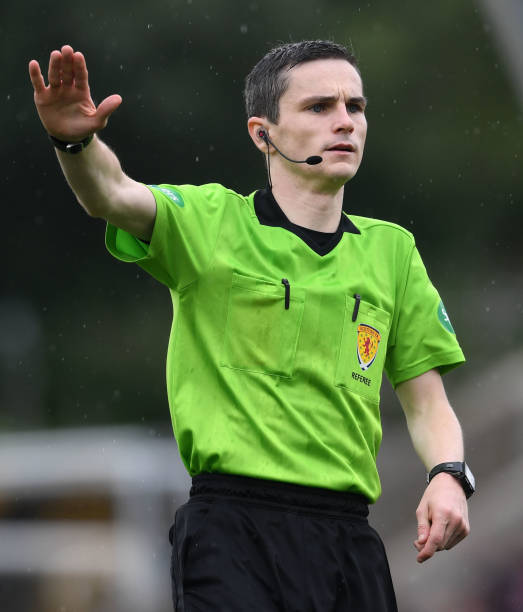
Two referees have come out as gay in an attempt to change the culture of Scottish football. Craig Napier and Lloyd Wilson become the first openly gay participants in men’s Scottish football since Justin Fashanu, who played for Airdrie and then Hearts in 1993 and 1994, several years after announcing his sexuality.
Napier, who took charge of 10 top-flight games in Scotland in the 2021-22 season, spoke about his sexuality in a video on the Scottish Football Association Twitter account.
“We need to see the climate change so that people do feel that they can be their true self and live happily and comfortably in their own skin, and that needs to then transcend into football,” he said.

Wilson, who referees in Scotland’s lower leagues, talked about his sexuality in a video on the YouTube channel of the mental health charity Back Onside.
Asked why he was speaking publicly now, Wilson said: “I think really the reason being that this has been a horrific journey, to be honest. A journey of maybe 17 years of living a life that I didn’t want to live, living a lie, living the way that other people maybe wanted me to live or that I thought other people wanted me to live. And probably dictated and directed in many ways by football.”
#Pride Month 2022#Scottish football referees#Craig Napier#Lloyd Wilson#football#fussball#fußball#foot#fodbod#futbol#futebol#soccer#calcio
51 notes
·
View notes